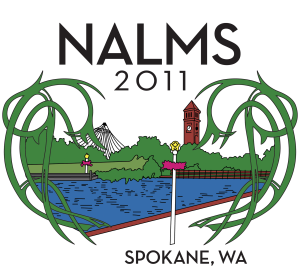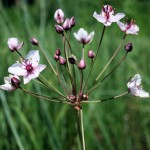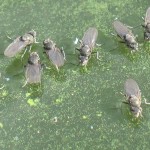NALMS Symposium visits Spokane
 by Bijay Adams
by Bijay Adams
The North American Lake Management Society held its 31st International Symposium October 26-28 at the Spokane Convention Center. It had been nearly 20 years since NALMS came to the Northwest, and the Convention Center, on the banks of the Spokane River, offered the perfect venue. The symposium presented a variety of educational and technical information on the theme of Diverse and Sustainable Lake Management.
Flowering rush threatens Washington waters
by Matt Bischof and Jenifer Parsons, Department of Ecology
 Flowering rush (Butomus umbellatus), an invasive aquatic plant native to northern Europe and western Asia, was first documented in North American in 1897 in Canada’s St. Lawrence River. Flowering rush has since spread to many states and provinces along the U.S.- Canada border, often because of its sale as an ornamental pond plant. Once established, the rush can form dense beds, crowding out native aquatic and shoreline plants and interfering with recreation. It is also implicated in increasing problems with swimmer’s itch; flowering rush provides habitat to the snails that host the swimmer’s itch parasite during part of its life cycle.
Flowering rush (Butomus umbellatus), an invasive aquatic plant native to northern Europe and western Asia, was first documented in North American in 1897 in Canada’s St. Lawrence River. Flowering rush has since spread to many states and provinces along the U.S.- Canada border, often because of its sale as an ornamental pond plant. Once established, the rush can form dense beds, crowding out native aquatic and shoreline plants and interfering with recreation. It is also implicated in increasing problems with swimmer’s itch; flowering rush provides habitat to the snails that host the swimmer’s itch parasite during part of its life cycle.
Observations on the appearance of brine flies at Willow Creek Reservoir, a freshwater lake
by Theodore Harris and Frank M. Wilhelm, Department of Fish and Wildlife Resources, College of Natural Resources, University of Idaho
 Have you ever experienced a lakeshore totally blackened by housefly-like flies, making you wonder what died, because only something like roadkill typically attracts such hordes? That was our reaction when we visited Willow Creek Reservoir (WCR) in Heppner, OR in early October for routine water sampling. Something was strange, though — the flies were not the pesky housefly type and seemed uninterested in us. They rafted on the water, and even seemed to crawl into it at the sides of the lake and along our experimental enclosures only to re-emerge, apparently none the worse for their underwater journey. This piqued our interest and made us take a closer look. It turns out that we witnessed an eruptive hatch of “brine” or “alkali” flies of the family Ephydridae
Have you ever experienced a lakeshore totally blackened by housefly-like flies, making you wonder what died, because only something like roadkill typically attracts such hordes? That was our reaction when we visited Willow Creek Reservoir (WCR) in Heppner, OR in early October for routine water sampling. Something was strange, though — the flies were not the pesky housefly type and seemed uninterested in us. They rafted on the water, and even seemed to crawl into it at the sides of the lake and along our experimental enclosures only to re-emerge, apparently none the worse for their underwater journey. This piqued our interest and made us take a closer look. It turns out that we witnessed an eruptive hatch of “brine” or “alkali” flies of the family Ephydridae
Where are they now?
Report from past WALPA Scholarship winner Rebecca Dugopolski
 Rebecca Dugopolski received a scholarship from WALPA in 2004 to help fund her Master’s research. Her research project involved nine months of weekly sampling to evaluate the effects of an aluminum sulfate treatment on Seattle’s Green Lake. Rebecca also spent six months at Uppsala University in Sweden on a Valle Fellowship. She graduated with a Master’s degree in Environmental Engineering from the University of Washington in December 2005. In January 2006, she began working for Herrera Environmental Consultants in Seattle and continues to do so, specializing in stormwater, water quality, and limnology projects.
Rebecca Dugopolski received a scholarship from WALPA in 2004 to help fund her Master’s research. Her research project involved nine months of weekly sampling to evaluate the effects of an aluminum sulfate treatment on Seattle’s Green Lake. Rebecca also spent six months at Uppsala University in Sweden on a Valle Fellowship. She graduated with a Master’s degree in Environmental Engineering from the University of Washington in December 2005. In January 2006, she began working for Herrera Environmental Consultants in Seattle and continues to do so, specializing in stormwater, water quality, and limnology projects.









